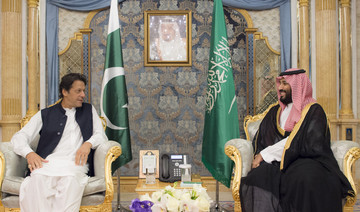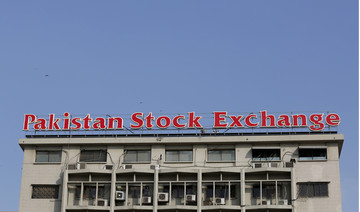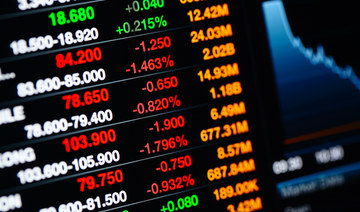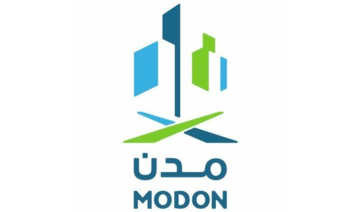KARACHI: Pakistan’s external balance of payments continues to haunt Prime Minister Imran Khan as he struggles to cut down the current account deficit which swelled by 60 percent in September this year, data released by the State Bank of Pakistan on Monday showed.
Pakistan suffered $592 million in losses as part of its current account deficit in August which jumped to $952 million in September, showing an increase of $360 million or 60.8 percent.
However, the deficit in the first quarter – from July to September 2018-19 – of the current fiscal year registered a slight decline to $3.665 billion from $3.761 billion during the same period last year. The lower deficit is primarily due to a 13.1 percent increase in remittances.
The July- September current account deficit is 4.7 percent of the GDP as compared to the 4.6 percent recorded a year ago.
Pakistan’s Finance Minister Asad Umar, on Saturday said he expected the balance of payment situation to improve between August and September.
“The Finance Minister said two days before that it was improving. It shows that his team and staff at Ministry of Finance is not feeding him the correct position,” Dr. Ikram Ul Haq, an expert on economic and legal matters, told Arab News.
The current account deficit is increasing due to increasing imports and insufficient exports. The country’s balance of trade deficit was recorded at $7.8 billion in the first quarter of the current fiscal year against $7.3 billion last year.
During the first quarter of this year, the country’s imports were recorded at $13.8 billion depicting an increase of 6 percent during the same period last year, mainly due to higher petroleum imports. Exports during the period increased by 3.6 percent to $5.9 billion due to higher textile and food exports.
Analyzing the data, Dr. Haq said: “The enhancement of customs duty and regulatory duty on various imported items alone cannot reduce balance of payment situation. The outflows for debt servicing, duty free machinery and inelastic items like petroleum products etc cannot be stopped. We need inflows as foreign direct investments FDIs to reduce the gap.”
During the recent visit of officials from the Pakistan stock exchange, Umar had said that the economy was not in an alarming situation as depicted by the media.
On Monday, stock market investors expressed mixed reactions to Umar’s assurances that the government had the economic situation of the country under control, with the share markets down by 85 points.
“Stocks closed lower on investor concerns for weak economic outlook amid dismal data for the current account deficit for Jul-Sep 2018 at $3.6 billion. Government concerns over IMF [International Monetary Fund] conditions for bailout package, likely raise in power tariff and likely surge in interest rates and further rupee depreciation and uncertainty over corporate earnings outlook at PSX played a catalyst role in bearish close,” Ahsan Mehanti, Chief Executive of Arif Habib Group, said.
The government has taken measures, including the imposition of import duty on some goods, to discourage imports and focus on exports instead.
Facing imbalances on external payment accounts, the government formally requested the IMF for a bailout program recently. Though no official word is available on the deal or the amount requested by Pakistan, Umar had said earlier that “the government is facing a $12 billion external financing gap.”
Pakistan’s current account deficit up by 60%
Pakistan’s current account deficit up by 60%
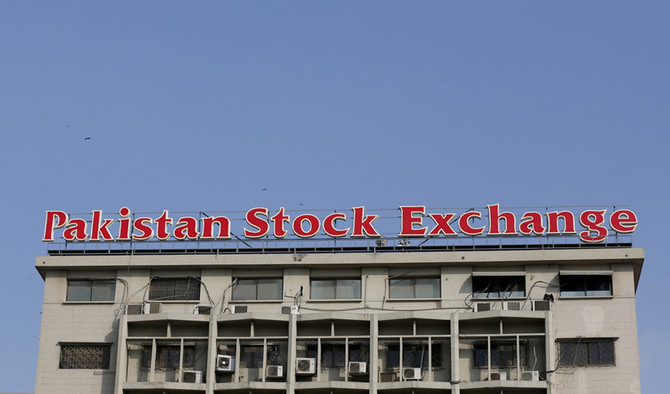
- Imports recorded at $13.8bn and exports at $5.9bn
- Stock market elicits mixed responses to finance minister’s comments
Saudi Arabia closes April sukuk issuance at $1.97bn
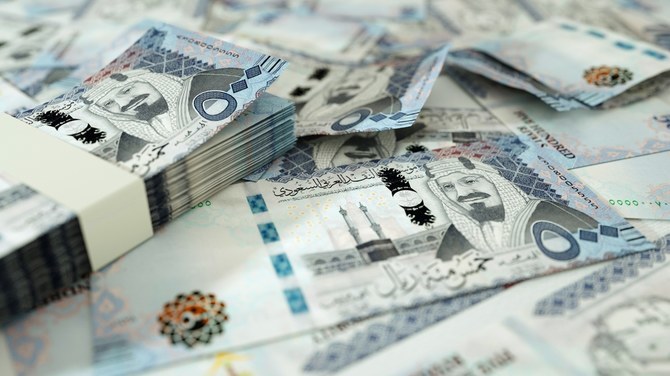
RIYADH: Saudi Arabia has completed its riyal-denominated sukuk issuance for April at SR7.39 billion ($1.97 billion), representing a rise of 66.44 percent compared to the previous month.
The National Debt Management Center revealed that the Shariah-compliant debt product was divided into three tranches.
The first tranche, valued at SR2.35 billion, is set to mature in 2029, while the second one amounting to SR1.64 billion is due in 2031.
The third tranche totaled SR3.51 billion and will mature in 2036.
“The Kingdom also plans to expand funding activities during the year 2024, reaching up to a total of SR138 billion from what has been stated previously in the Annual Borrowing Plan, with a portion of this amount already covered up to date,” said NDMC in a press statement.
It added: “This step comes with the aim of capitalizing on market opportunities to achieve proactive financing for the coming year and utilizing it to bolster the state’s general reserves or seize additional opportunities to enhance transformative spending during this year, thereby accelerating strategic projects and programs of Saudi Vision 2030.”
In March, NDMC concluded its second government sukuk savings round for March, with a total volume of requests reaching SR959 million, allocated to 37,000 applicants.
The center added that the financial product, also known as Sah, offers a return of 5.64 percent, with a maturity date in March 2025.
Earlier this month, Fitch Ratings, in a report, said that global sukuk issuance is expected to continue growing in the coming months of this year, driven by funding and refinancing demands.
The credit rating agency noted that various other factors like economic diversification efforts by countries in the Gulf Cooperation Council region and development of the debt capital market will also propel the growth of the market in the future.
In January, another report released by S&P Global revealed that sukuk issuance worldwide is expected to total between $160 billion and $170 billion in 2024, driven by higher financing needs in Islamic nations.
The report noted that higher financing needs in some core Islamic finance countries and easing liquidity conditions across the world are two crucial factors which will drive the growth of the market this year.
Closing Bell: TASI edges down to close at 12,355 points
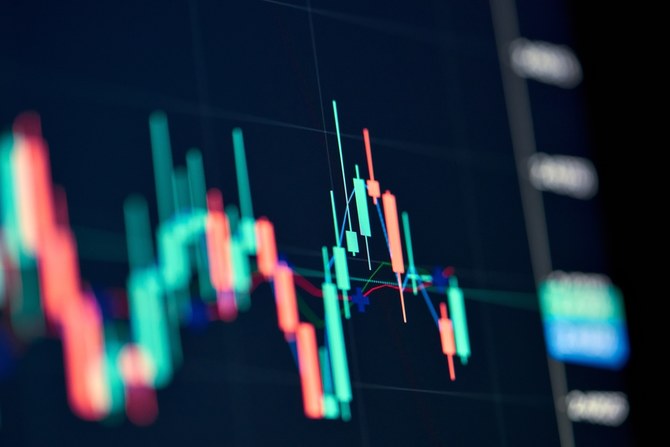
RIYADH: Saudi Arabia’s Tadawul All Share Index dipped on Wednesday, losing 128.72 points, or 1.03 percent, to close at 12,355.69.
The total trading turnover of the benchmark index was SR8.45 billion ($2.25 billion) as 41 of the listed stocks advanced, while 187 retreated.
Similarly, the MSCI Tadawul Index decreased by 14.78 points, or 0.95 percent, to close at 1,548.62.
Also, the Kingdom’s parallel market Nomu dipped, losing 365.84 points, or 1.37 percent, to close at 26,326.12. This comes as 17 of the listed stocks advanced, while 45 retreated.
The best-performing stock of the day was Al-Rajhi Co. for Cooperative Insurance as its share price surged by 9.87 percent to SR138.
Other top performers include Al Sagr Cooperative Insurance Co. and First Milling Co., whose share prices soared by 6.38 percent and 5.63 percent, to stand at SR35.85 and SR78.80, respectively.
In addition to this, other top performers included Batic Investments and Logistics Co. and Saudi Research and Media Group.
The worst performer was Al-Baha Investment and Development Co., whose share price dropped by 7.14 percent to SR0.13.
Other weak performers were National Co. for Learning and Education as well as Arriyadh Development Co., whose share prices dropped by 5.95 percent and 5.91 percent to stand at SR148.60 and SR22.60, respectively.
Moreover, other subdued performers also include Red Sea International Co. and AYYAN Investment Co.
On the Kingdom’s parallel market Nomu, the best-performing stock of the day was Osool and Bakheet Investment Co., as its share price surged by 12.05 percent to SR40.90.
Other top performers on Nomu include Arabian Plastic Industrial Co. and Lana Medical Co., with their share prices soaring by 7.42 percent and 3.59 percent, respectively, reaching SR37.65 and SR41.85.
The worst performer was Jahez International Co. for Information System Technology, whose share price dropped by 5.88 percent to SR32.
Other weak performers were Alhasoob Co. as well as Aqaseem Factory for Chemicals and Plastics Co., whose share prices dropped by 3.61 percent and 3.38 percent to stand at SR64.10 and SR62.80, respectively.
On the announcements front, HSBC Saudi Arabia, serving as sole financial advisor, joint bookrunner, underwriter, and lead manager, has announced the intention of Dr. Soliman Abdel Kader Fakeeh Hospital Co., known as Fakeeh Care Group, to proceed with its initial public offering on the main market of Saudi Exchange.
According to a statement, the offering will include 49.8 million ordinary shares, with 19.8 million existing shares and 30 million new shares upon completion.
This offering is set to represent 21.47 percent of the company's share capital post-capital increase.
Saudi Exchange and the Capital Market Authority approved the listing and IPO, respectively, with the pricing of shares to be determined after the book-building period.
Ministry tenders contract for expansion of Prince Faisal bin Fahd Stadium
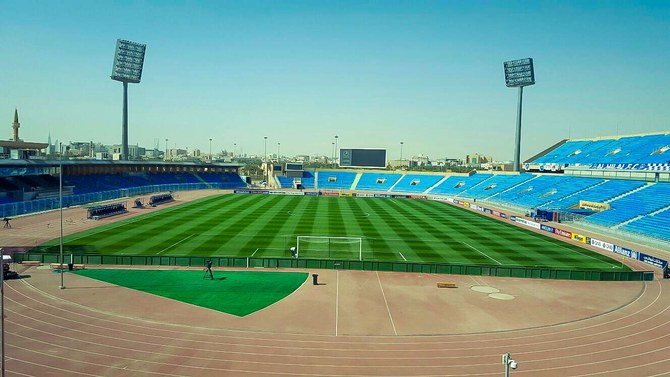
RIYADH: Saudi Arabia’s Sports Ministry has tendered a contract to boost the capacity of Riyadh’s Prince Faisal bin Fahd Stadium to 45,000 seats up from its current 22,188.
The expansion project comes as the Kingdom prepares to host the Asian Football Confederation Asian Cup in 2027, reported MEED.
This initiative aligns with Saudi Arabia’s plan to build sports stadiums under its SR10.1 billion ($2.7 billion) capital projects program.
The ministry requested proposals on April 8 and expects to receive bids on June 14.
In April, the ministry also tendered an early works contract for the expansion and development of the Prince Mohammed bin Fahd Stadium in Dammam.
At the time, the scope of the contract included the stadium’s decommissioning, demolition, and bulk excavation, as well as the relocation and setting up of related facilities.
In July 2023, the ministry invited firms to submit pre-qualification documents for the main construction contracts for the schemes in the capital projects program.
The undertakings, which are set for completion before the 2027 AFC Asian Cup, entail increasing the capacity of King Fahd Stadium in Riyadh to 92,000 seats and boosting the seating capacity of Prince Mohammed Bin Fahd Stadium to 30,000 seats.
It also includes increasing the seating capacity of the Prince Saud bin Jalawi Stadium in Al-Kahir to 45,000 and building a sustainable New Riyadh Stadium north of the city with 45,000 seats.
Another main element of the ministry’s projects program is the construction of as many as 30 new training grounds and facilities in proximity to the stadiums that will be used for the 2027 competition.
Construction on the projects is expected to start in July 2024 and scheduled to be completed by December 2025.
A total of 18 facilities will be ready in time for the 2026 AFC Women’s Cup.
PIF-owned ROSHN expands in Eastern Province with new residential project
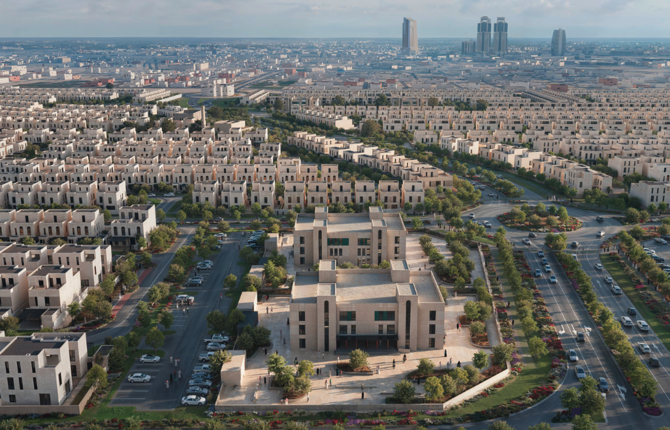
RIYADH: Saudi developer ROSHN Group has launched its first integrated community, ALDANAH, in the economic hub of Greater Dammam, featuring over 2,500 homes spread across 1.7 million sq. m.
The development, the second in the Eastern Province by the Public Investment Fund-owned giga-project, will cater to nearly 10,000 inhabitants who will benefit from exemplary energy conservation, including modern insulation, according to a press release.
ROSHN highlighted that the project is strategically located in the heart of Greater Dammam, at the meeting point of Dammam, Dhahran, and Al Khobar. It’s conveniently situated next to King Abdulaziz Road and is just a 20-minute drive from King Fahd International Airport.
The project will feature several amenities for residents, including a city experience center, a district mall, and three neighborhood retail centers. It will also include a primary healthcare center, mosques, and six schools, all reflecting the region’s rich cultural heritage, the release added.
The company also mentioned that the range of residences will offer a diverse selection of homes suitable for every family, including duplexes and villas tailored specifically for ROSHN’s latest community.
Industrial private sector investments in Saudi Arabia more than double to reach $1.8bn

RIYADH: Private sector investments in Saudi Arabia’s industrial field more than doubled in the first quarter of 2024, surpassing SR7 billion ($1.8 billion), according to official data.
This marks a significant increase from the SR3.34 billion recorded during the first quarter of 2023, according to a report released by the Saudi Authority for Industrial Cities and Technology Zones, also known as MODON.
The report revealed a substantial rise in the number of constructed factories, reaching 6,683 in the first three months of 2024 compared to 5,894 in the same period last year.
Moreover, the total number of logistics contracts surged to 367, up from 223 in the first quarter of 2023.
The report also highlighted a significant growth in industrial contracts, with 276 agreements issued by end of March, nearly doubling the figures from the first three months of 2023.
Jeddah Third Industrial City led in contract issuance with 76 agreements, followed by Al Kharj Industrial City with 47. Sudair Industrial and Business City recorded 20 contracts, while Dammam Third Industrial City and Dammam Second Industrial City had 18 and 16 agreements, respectively.
Furthermore, the total regulatory visits conducted in industrial cities during the first quarter amounted to 1,867, underscoring MODON's rigorous oversight.
In terms of sectoral distribution, food industries secured the highest number of contracts in the first quarter of 2024, constituting 24 percent of the total. They were followed by mining at 12 percent, rubber products industries at 12 percent, chemicals at 8 percent, and electrical equipment at 7 percent.
Additionally, the number of food factories operating in the Kingdom reached 1,300, indicating the country’s expanded capacity in the sector. This underscores its commitment to the “Food Industry Localization” initiative, aimed at enhancing productivity, local production, and quality.
These figures come as MODON prepares to engage as a strategic partner in the inaugural Saudi Food Manufacturing Show.
Scheduled from April 30 to May 2, at Riyadh Front, the event will be under the patronage of the Minister of Industry and Mineral Resources Bandar Al-Khorayef.
MODON plans to showcase its products, services, and comprehensive solutions for the food industry at the show, targeting investors, small and medium enterprises, and entrepreneurs.
This effort is aligned with MODON’s role in the National Industrial Development and Logistics Program, aimed at fostering sustainable growth and enhancing value chains.
The show is expected to host 500 participants from around the globe, including ministers, officials, and industry leaders, as well as CEOs, investors, and experts.
It will feature discussion panels, workshops, and exhibitions, providing a vital platform for displaying the latest in services, products, and solutions for the food industry and its supportive sectors.


